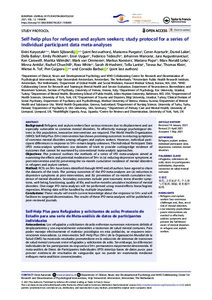Self-help plus for refugees and asylum seekers; study protocol for a series of individual participant data meta-analyses
Karyotaki Eirini; Sijbrandij Marit; Purgato Marianna; Acarturk Ceren; Lakin Daniel; Bailey Della; Peckham Emily; Uygun Ersin; Tedeschi Federico; Wancata Johannes; Augustinavicius Jura; Carswell Ken; Välimäki Maritta; van Ommeren Mark; Koesters Markus; Popa Mariana; Leku Marx Ronald; Anttila Minna; Churchill Rachel; White Ross; Al-Hashimi Sarah; Lantta Tella; Au Teresa; Klein Thomas; Tol Wietse A.; Cuijpers Pim; Barbui Corrado
https://urn.fi/URN:NBN:fi-fe2021093048996
Tiivistelmä
Background Refugees and asylum seekers face various stressors due to displacement and are especially vulnerable to common mental disorders. To effectively manage psychological distress in this population, innovative interventions are required. The World Health Organization (WHO) Self-Help Plus (SH+) intervention has shown promising outcomes in reducing symptoms of common mental disorders among refugees and asylum seekers. However, individual participant differences in response to SH+ remain largely unknown. The Individual Participant Data (IPD) meta-analysis synthesizes raw datasets of trials to provide cutting-edge evidence of outcomes that cannot be examined by conventional meta-analytic approaches.
Objectives This protocol outlines the methods of a series of IPD meta-analyses aimed at examining the effects and potential moderators of SH+ in (a) reducing depressive symptoms at post-intervention and (b) preventing the six-month cumulative incidence of mental disorders in refugees and asylum seekers.
Method RCTs on SH+ have been identified through WHO and all authors have agreed to share the datasets of the trials. The primary outcomes of the IPD meta-analyses are (a) reduction in depressive symptoms at post-intervention, and (b) prevention of six-month cumulative incidence of mental disorders. Secondary outcomes include post-traumatic stress disorder symptoms, well-being, functioning, quality of life, and twelve-month cumulative incidence of mental disorders. One-stage IPD meta-analyses will be performed using mixed-effects linear/logistic regression. Missing data will be handled by multiple imputation.
Conclusions These results will enrich current knowledge about the response to SH+ and will facilitate its targeted dissemination. The results of these IPD meta-analyses will be published in peer-reviewed journals.
Kokoelmat
- Rinnakkaistallenteet [29337]
